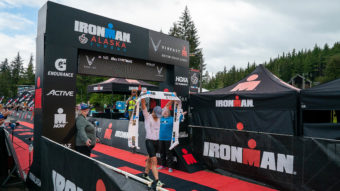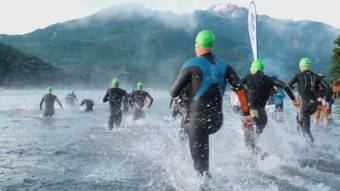
Funny thing about people who subject themselves to swimming in 56-degree water, biking 112 miles in the rain and running a marathon on the same day: they grin as they talk about it.
“It was wet all the way, pouring down, rain was pouring,” said Joseph Paray, a registered nurse from New York who completed his first full Ironman triathlon in Juneau last Sunday. “The wind was brutal. The elevation of the climb is brutal.”
His friend Richard Secretaria, a medical tech from New Jersey, was also a finisher. He was almost giddy as Paray talks about it. Secretaria said his bike got so dirty, it looked like he was mountain biking instead of racing on the road.
It almost sounds like they’re complaining, but they really enjoyed their time in Juneau. In part because they said they were representing the Philippines when they raced. When they first arrived, they introduced themselves on an Ironman Alaska Facebook group.
“Everybody’s sending us messages, like, ‘How can we meet each other?’ Like, we feel like we’re celebrities here,” Secretaria said, laughing.
“The support of the Filipino communities in Juneau? They rock, man,” Paray said. “It was like it was like back home. They were everywhere!”
Of course, they’re supporting Juneau, too, with their visit. Last year, when a local travel organization was negotiating to host the Ironman Alaska triathlon, boosters predicted up to 1,500 athletes would come, plus friends, family and support staff. It would be an economic boon.
The number of people to actually attempt the inaugural Ironman Alaska ended up falling well short of that. Ironman said there were 850 athletes, of whom 62 were locals.
And yet, another early estimate — that the event would pump $7 to $9 million into the local economy — appears to be on the money.
Like most of the athletes, Paray and Secretaria didn’t come alone. An Ironman official said that on average, each participant brought about three people with them. Paray and Secretaria brought their significant others, and they were here for seven nights.
The two couples split a hotel room and car rentals that they booked early on, before registration for the race had even opened. At first, they booked six nights, but later decided to add a seventh. By then, the per-night rate had doubled to almost $350.
Besides Ironman events, they visited the Mendenhall Glacier, rode the Goldbelt Tram and ate at local restaurants.
“Not to mention, you still have to buy, you know, some stuff. You know, souvenirs,” Secretaria said.
“Souvenirs, yeah!” Paray said. “You’ve been to Alaska! You need some remembrance.”
They figure each couple spent around $4,000 on the trip.
City Finance Director Jeff Rogers was also an Ironman finisher. On Monday, he was browsing the swag at a pop-up shop at Centennial Hall.
“I got a jacket and a hat, ‘cause the hat I run in is falling apart, and a couple of water bottles,” Rogers said.
The cashier rang him up for just under $200, which includes about $10 of city sales tax.
From hosting Ironman, Rogers is expecting a noticeable bump in the city’s revenue from sales tax and the extra 9% tax on hotel rooms and short-term rentals.
“I think a big weekend of a couple thousand people in town certainly has an impact, not only on city revenue but just on the health of local businesses. And certainly a lot of people rented out their houses, trying to help and be generous, but also put a little money in their pockets,” he said. “So I think the economic impact will be big.”
City officials and race organizers aren’t aware of any formal economic impact studies underway around the event. But Meilani Schijvens, who runs the economic publications firm Rain Coast Data in Juneau, was personally interested in the race. She had the athlete tracking app, was following threads about it on Facebook and was game to share a rough economic impact estimate of her own.
“To be clear, I have not done a study on this, right?” she said. “These are just my numbers, because I obsess over all these things, and I love, like, trying to figure these things out.”
But she has done robust analyses in the past, backed by surveys and more ground-truthing, to get at what the typical independent traveler spends during a visit. To build some spending assumptions for this event, Schijvens looked at the Ironman schedules, participant numbers, Facebook chatter — even the weather.
“A typical independent traveler, we would assume they all went on an excursion,” Schijvens said. “And I just decided 20% of them went on excursions, partly because we had an atmospheric river. And a lot of the excursions were closed down, like the helicopter tours people definitely would have gone on.”
All together, she figures the out-of-town participants and their travel companions put roughly $8 million directly into Juneau’s economy.
The race organizers also spent a lot in the community. Liz Perry runs Travel Juneau, the city’s destination marketing organization. It partnered with Ironman to host the event.
Perry said the Ironman organizers used local vendors as much as possible, from the logo design by local artist Crystal Kaakeeyáa Worl to the port-a-potties from Alaska Waste.
Which means some of the athletes’ registration fees and the licensing fee Travel Juneau paid Ironman to host the event also came back to the community. Travel Juneau paid $50,000 this year, and will pay $125,000 in 2023 and again in 2024.
Perry said volunteers representing local nonprofits may also get some cash grants from the Ironman Foundation. And there were a lot of volunteers — Ironman said more than 1,400.
“So the entire community has benefitted from this, from top to bottom,” Perry said. “So that ripple effect is going to be really impactful for the whole city.”
There’s even free word-of-mouth from all the proud Ironman participants themselves. Paray and Secretaria both said they plan to come back.
“Maybe not for the race, but for vacation,” Paray said. “Yeah, this is a must. I must tell my friends, I will tell everyone who I meet, ‘Yeah, go to Juneau, go to Alaska. It’s a really nice place.’”
They said their triathlon club back home is eager to hear how it went.
Registration for next year’s Ironman Alaska triathlon in Juneau opens Aug. 15.


